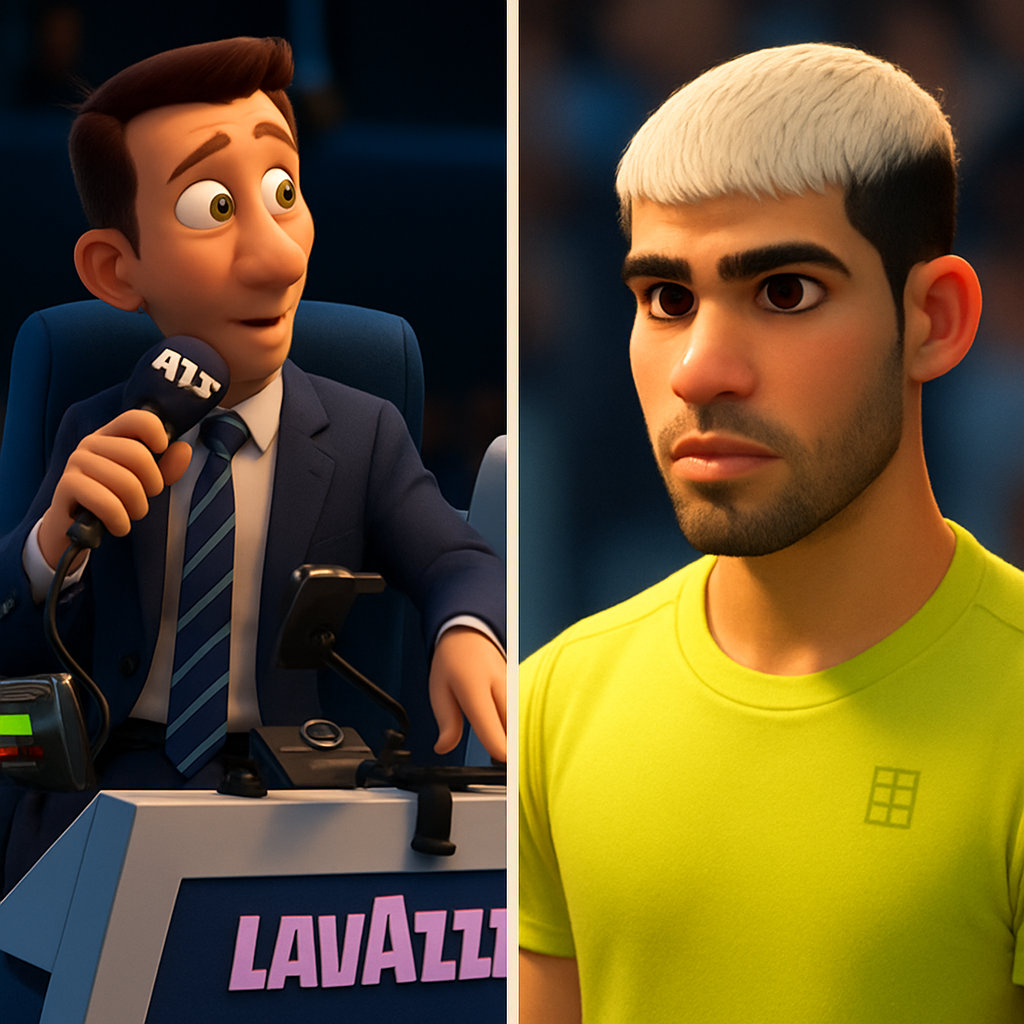TURIN — In a moment that transcended sport and underscored the profound humanity of its athletes, Carlos Alcaraz dramatically halted his crucial ATP Finals group-stage match against Daniil Medvedev on Wednesday evening after urgently alerting the chair umpire to a medical emergency in the crowd.
The incident occurred deep in the second set, with the match poised at 5-5 in a tense tie-break. Alcaraz, serving to stay in the set, suddenly stopped his service motion, turned to chair umpire Mohamed Lahyani, and pointed into the stands behind him. A concerned hush fell over the Pala Alpitour as Lahyani immediately climbed down from his chair to assess the situation.
What followed was a swift and coordinated response. After a brief consultation with Alcaraz, Lahyani urgently called for a tournament doctor and paramedics over his walkie-talkie. Play was suspended for approximately fifteen minutes as medical professionals attended to a spectator who appeared to be experiencing a serious health episode. The match resumed only after the individual had been safely escorted from the stands for further medical attention.
A Tense Moment in a High-Stakes Clash
The context of the stoppage could not have been more pressurized. Alcaraz, the 20-year-old Spanish sensation, was fighting to keep his hopes alive in the season-ending tournament. Having lost his opening round-robin match to Alexander Zverev, a defeat against Medvedev would have all but eliminated him from contention for the semi-finals. The second-set tie-break was a pivotal moment, yet Alcaraz's instincts prioritized a fellow human's well-being over a critical point.
Both players displayed immense sportsmanship. Medvedev did not protest the delay and instead joined Alcaraz in showing concern, retrieving towels and water bottles for themselves as they waited for the situation to be resolved. The Russian later commended Alcaraz's quick thinking, stating in his post-match press conference, "Carlos did the right thing. You could see it was a serious moment. The most important thing is that the person is okay."
Post-Match Reactions and Relief
When play resumed, Alcaraz managed to save a set point and went on to claim the second set, eventually winning the match 6-4, 6-7(7), 6-3 in a thrilling two-hour and 49-minute battle. However, the victory was secondary in his mind during the post-match on-court interview. His first words were about the spectator. "I just wanted to know if the person is okay," he told the interviewer, his concern still evident.
He elaborated on the moment he noticed the emergency. "I saw someone wasn't good in the crowd. I thought it was something serious. I was just thinking about that. We stopped the match and thankfully the doctors and the paramedics were there and did a great job. I hope the person is well." The tournament organizers later released a statement confirming the spectator had received appropriate medical care and was in a stable condition.
A Pattern of Player-Led Vigilance in Tennis
This is not an isolated incident in professional tennis. Players, with their unique sightlines and intense concentration, are often the first to notice distress in the crowd. The sport has seen several such interventions, which highlight a collective responsibility that exists within the tennis community. Key recent examples include:
- Andy Murray, US Open 2023: The Briton famously halted a match to help a ball girl who was feeling unwell.
- Coco Gauff, US Open 2022: Gauff alerted officials to a spectator who was suffering from a cough that sounded serious.
- Novak Djokovic, Australian Open 2020: Djokovic paused his match to call for medical aid for a fan experiencing a health issue.
These actions, while disruptive to the flow of a high-stakes competition, are universally praised. They reinforce that the well-being of everyone involved—players, staff, and fans—is paramount. The ATP and WTA tours have protocols in place for such events, but it is the human element, the quick reaction of an individual like Alcaraz, that truly activates the safety net.
The Aftermath: Alcaraz's Fight for the Semi-Finals
Despite the emotional and physical disruption, Alcaraz displayed remarkable resilience to close out the match against the world No. 3. The victory leveled his record at 1-1 in the Red Group, setting up a virtual quarter-final clash against Andrey Rublev in his final round-robin match. The scenario for Alcaraz is straightforward: win, and he advances to the semi-finals; lose, and his season is over.
Reflecting on his ability to refocus, Alcaraz said, "It was difficult to get back into the match, for sure. You are thinking about the person, not the tennis. But we are professionals. We have to come back, to stay focused, and try to win the match. I'm really happy I did it." His coach, Juan Carlos Ferrero, was seen applauding his player's composure from the player's box, a testament to Alcaraz's maturity beyond his years.
A Reminder of What Truly Matters
The evening in Turin served as a powerful reminder that while the ATP Finals crown a year-end champion and bestow significant glory and prize money, some things are infinitely more important. Carlos Alcaraz's decisive action, supported by Daniil Medvedev's understanding and the swift work of the medical team, turned a potential tragedy into a story of collective humanity. In a year where he has captured his first Wimbledon title and solidified his place at the pinnacle of the sport, this moment of off-court leadership may well be one of his most defining and admirable acts.
The tennis world now awaits an update on the spectator's full recovery while also turning its attention back to the court, where Alcaraz will continue his quest for a first ATP Finals trophy, having already proven himself a champion in the most human sense of the word. As the sport moves forward, this incident will stand as a benchmark for sportsmanship and priority, where a single pointed finger from a player carried more weight than any forehand winner.

